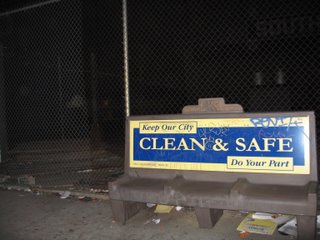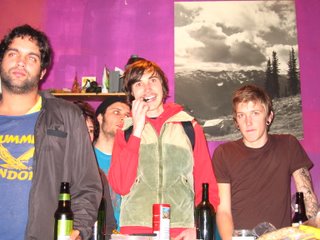Sunday, December 31, 2006
books read for 2006
* = a friend made me read it
# = a writer or about writer who has committed suicide (that I know)
1. Across the Acheron -Monique Wittig
2. The Math Gene -Keith Devlin
3. Isabelle: the Life of Isabelle Eberhardt -Annette Kobak
4. A Chance Meeting -Rachel Cohen
5. The Immense Journey -Loren Eiseley
6. The Dispossessed -Ursula LeGuin
7. The Death and Death of Great American Cities -Jane Jacobs
8. What am I Doing Here? -Bruce Chatwin
9. Ludwig Wittgenstein: A memoir -Norman Malcom
10. Madame Bovary -Gustave Flaubert (trans. Paul de Man)
11.Three Women (Alma Mahler-Werfel, Gertrude Stein, Lous Andres-Salome) -Walter Sorell
12. The Road to Santiago -Kathryn Harrison
13. Fin de Siècle Vienna -Carl Schorske
14. Gathering Moss: A Natrual & Cultural History of Mosses -Robin Wall Kimmerer
15. # Moscow Diary -Walter Benjamin
16. # The Disinherited: The Life of Gérard de Nerval -Benn Sowerby
17. The Urban Ideal: conversations with Paolo Soleri
18. City Life: Urban Expectation in a New World -Witold Rybczynski
19. *Passage -Connie Willis
20. Color: A Natural History of the Palette -Victoria Finlay
21. The Flâneur -Edmund White
22. # The World of Yesterday -Stefan Zweig
23. Sade my Neighbor -Pierre Klossowski
24. California Forests and Woodlands: A Natural History -Verra R. Johnston
25. Oakland: A History -G.A. Cummings & E.S. Pladwell
26. Waiting for Godot -Samuel Beckett
27. # Insatiability -Stanislaw I. Witkiewicz
28. My Lives -Edmund White
29. *Bellwether -Connie Willis
30. Stiff: The Curious Lives of Human Cadavers -Mary Roach
31. Nausea -Jean-Paul Sartre
32. Tête –à Tête -Hazel Rowley
33. # Shadows of the Sun: The Diaries of Harry Crosby ed. Edward Germain
34. Exquisite Corpse: Surrealism and the Black Dahlia Murder -Mark Nelson & Sarah Bayliss
35. # Freud's Vienna and other Essays -Bruno Bettelheim
36. # The Painted Bird -Jerzy Kosinski
37. Blue Angel -Francine Prose
38. Faust & Yakov Pasynkov -Ivan Turgenev
39. The Portrait of Mr. W.H. -Oscar Wilde
40. Justine -Lawrence Durrell
41. The Great Gatsby -F. Scott Fitzgerald
42. The Modern Mind: An Intellectual History of the 20th Century -Peter Watson
43. Blue of Noon -Georges Bataille
44. Shakespeare and Company -Sylvia Beach
45. #A Room of One's Own -Virginia Woolf
46. The Great Pianists -Harold Schonberg
47. Curious Naturalists -Niko Tinbergen
Tuesday, December 26, 2006
ataraxy
The past has past. I can't complain, nor would I want to. I drank three pots of pu-erh on Christmas Eve. and read the biography of Weldon Kees. I felt calm; this is the way I hope always get to spend my free time: books and tea (or an amaretto sour). I sincerely hope that all those who I have loved are loved now. I wish them all moments of joy.
A quick link of an article on Weldon Kees-
http://www.newyorker.com/critics/atlarge/articles/050704crat_atlarge?050704crat_atlarge
kisses~
Thursday, December 14, 2006
esurient


"The great naturalist, Fritz Müller- who was the first to describe the scent scales- mentions how, on his journeys in Brazil, he often carried a Paplio Grayi with him, just for the purpose of sniffing its scent when the mood took him." - Niko Tinbergen Curious Naturalists
"Ulysses, like everything else of Joyce's, was written entirely by hand. He used blunt black pencils- he found the ones he wanted at Smith's in Paris-and pencils of different colors to distinguish the parts he was working on. Fountain pens he didn't understand at all. They bewildered him. Once I found him struggling to fill one, covering himself with ink as he did so. Sylvia Beach Shakespeare and Company
Quicknotes on the books I finished reading this week:
The Great Gatsby, by F. Scott Fitzgerald. I read it before when I was young. Now after reading it again, I am convinced I should read it at least once every other year. As I was reading, I would come across an amazing line that I would want to write down, but I just couldn't stop reading. Nothing I have read exposes the farce of the American dream as well as this novel. Material desires hiding the gaping emptiness of a life not examined.
I finished up the novel while I was at Bourbon & Branch in SF, a faux speakeasy-era bar with expensive, but good-looking cocktails; I had two. A few things I learned: Fitzgerald was an alcoholic, but he never wrote drunk, he was an amazingly sober writer and it shows in his prose. He was born in Minnesota; a Mid-Westerner transplanted to the East Coast; like Gatsby. And like Gatsby, Fitzgerald fell in love with a socialite (Zelda) who rebuffed his initial marriage proposal. He wrote his first novel, which became a success, he made some money, and he got to marry the girl; who ended up going insane and was confined to a mental institution. Nothing like love to drive you mad.
Speaking of mad, I also read The Blue of Noon, by Georges Bataille. Talk about a crazy novel, leave to Georges to leave me with my mouth open, thinking, "I can't believe someone wrote that." My head spun reading this novel of drunkenness and despair; written in 1935, all around, Europe falls into pieces and the characters lose themselves in grotesque debauchery and perversity.
I also read The Modern Mind, by Peter Watson. A dash into the great-breaking ideas that affected and transformed the 19th-20th Centuries. There's some decent reviews of the book here. I agree with most of it. It is a good book to get started on developing a foundation of historical understanding for the last 100+ years. Watson's analyses on novels were succinct and inspired, so much that I added another half dozen to read, plus I read The Great Gatsby again. I developed a mini-crush on this Watson fellow, even though he's older than my father. I imagined all the books he must have read, all the mental calculations it took to connect it together in this massive book; and it fulfilled my esurient need for understanding how the parts fit together. It could have plodded along, but Watson uses his journalistic skill to keep it an engaging read.
Wednesday, December 13, 2006
Blue


"My life was following an increasingly crooked path. I used to go to various places for drinks, walk around aimlessly, and finally take a taxi home. It was then, in the depths of the taxi that I could think of Dirty and burst out sobbing. I no longer even felt any pain, or the least anxiety; inside my head, I was aware of nothing but absolute stupidity. It was like a state of perpetual childishness. I was shocked by the madness enacted by my wild state of mind whenever I wanted to tempt fate, and I recalled the irony and courage I had shown; and, of all that, the one thing left was the feeling that I was some kind of idiot, extremely touching perhaps, but in any care ludicrous. " Georges Bataille Blue of Noon
Monday, December 11, 2006
Friday, December 08, 2006
Treehouses in Turkey
Cioran's grave at Cimetière du Montparnasse, Paris
Since I'm being personal-
Thoughts which come to my head when it is 2AM and I am faced with a second night of sleeplessness:
I often wonder if romantic love is a folie à deux, a sort of socially-sanctioned lunacy; and I want out of the madhouse. I wonder if sex and love collide into a dangerous cocktail of delusion; a sly toxin intoxicating the imbiber with destructive dreams. Romance is one bland illusion, slated to disappoint every time.
If some moony-eyed moron ever comes running towards me babbling such love-laced obscenities, I 'm going to punch him square between the eyes to clear his head. "Proselytize elsewhere," I will scoff, "I'm an ex-convert of your crap religion."
Maybe it's just me. After all, I have sought out these very captivating jailors, only to resent the trap I help them create to confine me. A part of me (a large part) feels that I would prefer to run off to some remote city in Iceland and spend the rest of my life reading books, never to speak to anyone I know, ever again (or maybe a tree house in Turkey- if there are still trees in Turkey).
I love my current boyfriend, I really do. I think he's the kindest, most charming person I know. And, despite my seemingly grouchy demeanor, I do believe in love and relationships. I believe in the kind where people genuinely like to talk to each other and like each other's company. I believe in someone who will stroke your hair when you are saddened by the world, and who will give you kisses on the head before you go to sleep.
I do not believe in the tumultuous, storm-saturation that masquerades as some sort of emotional connection. I will never allow myself to fall into that silliness ever again.
Then again, maybe I just need more sleep.
Wednesday, December 06, 2006
Under capitalism, man exploits man. Under communism, it's just the opposite

Brassaï's grave in Cimetière du Montparnasse, Paris
While I was looking up some info about J.K. Galbraith, I ran into these capitalist/communist jokes. Galbraith is credited with this quip, but actually, he only reported it in his memoirs. I like this version of the abovementioned joke because it reminds me of a man I met while I was in Moscow in 2005.
Q: Is there a difference between capitalism and communism?
A: In principle, yes. In capitalism, man exploits man. In communism, it's the reverse.
I thought it was a quirk that he began many of his sentences with, "In principal…." But now I understand there may have been a precedent for it. See below for other jokes and quotes!
Personally, the last week had been spent with having a bloody nose a day, and having very negative feelings about a past relationship (CC). When I remember certain events which happened in this relationship, I am filled with disappointment of how things never turned out, and disgust with myself for letting myself be treated with such blatant disrespect and inconsideration. But in the end I realize, people are as they are. You cannot expect or demand love from anyone. If they chose to give it to you, then it is a gift. If you give love to someone who does not recognize the value of it, you cannot take it personally. This love has no value to them, and there is nothing that you can do to change that. You should not let their attitude devalue you. I had let myself be devalued for too long, and it upsets me.
But then I had this dream last night. I think it was brain telling me why I allowed myself to be in this situation. It was a reminder of what I liked about this person. Where the relationship was despairing most of the time; the friendship was really valuable to me. I don't know why we didn't just stay friends and not cross into that relationship line; that was our worst mistake.
The dream:
There is a performance in a warehouse with CC and some other people. I am undecided in attending because I don't want to see CC, however, another person who is performing asks me to come up, so I do. I expect that CC will give me the cold, indifferent treatment, as he often does, so I stand in an out of the way place. To my surprise, he comes to me and gives me a hug. We have a little awkward conversation. The performance happens- then I am about to leave. CC offers to walk with me. We walk around the city, looking a various things. One thing is a series of transport devices which allows a person to turn a crank and a plank moves in a spiral way to allow the person to travel great distances with little effort. Sometimes we are in a car. We talk and walk around in a very friendly fashion, overall I feel happy about this. The dream then moves onto something else, which I don't remember.
When I woke up, I felt better about the situation. I doubt this friendly interaction will ever happen between us, but I guess the memory of how we used to be friends makes me feel a little better.
Now some levity:
We pretend to work and they pretend to pay us,
Under Communism speech is strictly regulated, so opinion goes unheard.Under Capitalism speech is totally free, so opinion goes unheard.
Q: Is it true that the poet Vladimir Mayakovsky committed suicide?
A: Yes, it is true, and even the record of his very last words is preserved: "Don't shoot, comrades."
Q: Is it true that Tchaikovsky was homosexual?
A: Yes, but we love him not only for this.
Monday, December 04, 2006
Cabinet particulier

Samuel Beckett's grave in Cimetière du Montparnasse, Paris- May 2006
"Under modernity there can be no question about the moral authority of the self. The only question is that of how the self is to be fulfilled-by hedonism, by acquisitiveness, by faith, by the privatisation of morality or by sensationalism." -Daniel Bell (from Peter Watson's The Modern Mind)
A decent review of the book, Casanova's Women, a rather titillating read for a Monday-
http://www.salon.com/books/review/2006/12/02/summers/index.html
Friday, December 01, 2006
modernist novels

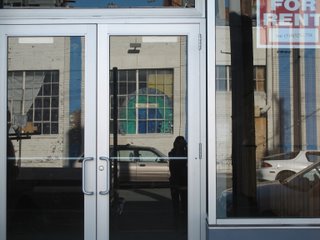
Downtown Oakland
"Far off events, transformed by memory, acquire a burnished brilliance because they are seen in isolation, divorced from the details of before and after, the fibres and wrappings of time. The actors, too, suffer a transformation; they sink slowly deeper and deeper into the ocean of memory like weighted bodies, finding at every level a new assessment, a new evaluation in the human heart." Lawrence Durrell Justine
I finished reading this last night. Another classic which embodies the characterists of the modernist novel. A good review here. And if you want to read a 30 page interview with Durrell to learn about his roving life in between the world wars- go here.
And if you want to understand the modernist novel- here's a handy little comparison I found.
Wednesday, November 29, 2006
Sleep deprived
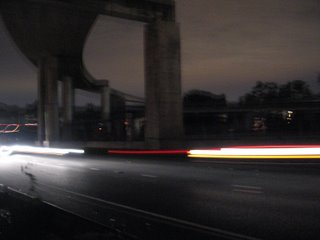

"The great events of life often leave on unmoved; they pass out of consciousness, and when one thinks of them, become unreal. Even the scarlet flowers of passion seem to grow in the same meadow as the poppies of oblivion. We reject the burden of their memory, and have anodynes against them. But the little things, the things of no moment, remain with us. In some tiny ivory cell the brain stores the most delicate, and the most fleeting impressions." - Oscar Wilde
The Portrait of Mr. W.H.
A dream I had a few nights ago: I was on a bus with a famous percussionist. He played a rhythm by hitting drum sticks against the various parts of the bus. On the bus was an instrument that resembled a guitar, but its body was a body of some sort of animal and the neck was a bone; a neck bone (very long) or a thigh bone. The body was stitched together to keep it in one piece. But it was also stuffed and it was heavy. However, one could strum the strings and make a decent sound. I carried this burdensome instrument off the bus and into city streets. I had to go up a hill and after awhile, I tired of carrying it (it felt as heavy as a decapitated body and it slumped in my arms uncomfortably), so I left it among some flower pots on someone's patio and went on up the hill without it, feeling relieved.
Monday, November 27, 2006
metronomes along deserted pavements


pictures of random scenes in Paris
I'm not feeling particularly wordy today. I wish I could rinse the reminisces of a letter written a year ago. Better yet, have Lawrence Durrell say it for me, from Justine:
"Lying with one's own kind, enjoying an experience, one can still keep free the part of one's mind which dwells in Plato, or gardening, or differential calculus. Sex has left the body and entered the imagination now…."
"Who invented the human heart, I wonder? Tell me, then show me the place where he was hanged."
"We have been told so often that history is indifferent, but we always take its parsimony or plenty as somehow planned; we never really listen…now on this tenebrous peninsula shaped like a plane leaf, fingers outstretched (where the winter rain crackles like straw among the rocks), I walk stiffly sheathed in wind by a sealine choked with groaning sponges: hunting for the meaning to the pattern."
"The modern novel! The grumus merdae left behind by criminals upon the scene of their misdeeds."
Wednesday, November 22, 2006
indulge me

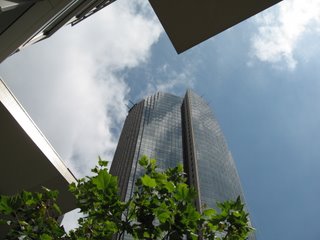


Not much to say. I've been sick with a cold, so I bring pictures of San Francisco and some weird links:
I hope this doesn't happen to you when you go home for the holidays!
Amazingly, this actually has happened to me!
Art drives people to strange actions!
Friday, November 17, 2006
Taxodiaceous

"An archeologist is the best person to be married to- the older you get, the more interested he is." - Agatha Christie (who was married to Max Mallowan, an archeologist)
America: "instead of being the most successful country in the world, is the greatest failure. It's the greatest failure because everything it was given more than any other country…Its main idea is that everlasting game of trying to possess your own soul by the possession of something outside of it." - Eugene O'Neill
from The Modern Mind - Peter Watson
Notes on last night:
Feelings of affection and grief intertwine within me as a morbid dance. I drink a glass of wine and drift towards the California Botanical Society meeting on a Redwoods lecture; trying to logicize my tempestuous emotions. A silver Honda Civic passes as I stand at the street corner waiting to cross. I am filled with an overwheming desire to beat and destroy it; not because of what it is, but because of what it reminds me. This is not depression, this is not confusion, this is not lonliness; but for the end of me, I cannot tell you what this is.
Wednesday, November 15, 2006
Lickerish
"What a splendid thing it is to sleep and dream, just think! The whole of our life is a dream and the best thing in it is, again, dreaming."
"A sort of spiritual hush has come upon me since I moved in here; I don't want to do anything, I don't want to see anyone, there's nothing to dream about, I'm too idle to have ideas-but I'm not too idle to think: these are two different things…"
- Ivan Turgenev Faust
I've been reading this book: The Modern Mind: An intellectual history of the 20th Century by Peter Watson, who wrote an excellent article copied below:
History shows that true innovation has disappeared from our society
Peter Watson Sunday May 22, 2005 The Observer
Next month, in Christie's big sale of valuable books and manuscripts, the highlight is a rare offprint of the famous volume 17 of Annalen der Physik, in which Albert Einstein's three great ideas - on the special theory of relativity, the law of mass-energy equivalence (E=mc2), and the Brownian Theory of motion - were revealed. The occasion marks the 100th anniversary of Einstein's breakthrough.
But the sale of Einstein's papers recalls to mind that they were not the only remarkable event of that remarkable year. Matisse painted Luxe, calme et volupté and Les Fauves were born. Cézanne produced Les Grandes Baigneuses, whose lozenges of colour first pointed to cubism and abstraction. Lenin published Two Tactics, EM Forster wrote Where Angels Fear to Tread, the first regular cinemas opened, Richard Strauss unveiled Salomé and Freud followed The Interpretation of Dreams with his Three Contributions to the Theory of Sex. The Austin motor company (remember that?) was formed, the first motor buses in London appeared, the first neon signs.
The year 2005 can't begin to compete with 1905 in terms of important innovations. Last week's announcement that British and Korean scientists have successfully cloned human embryos only reinforces the point. What else of real importance has happened this year?
We flatter ourselves that we live in interesting times but isn't this just one more example of that particular blindness our solipsistic age has about itself, a more severe form of the disease whereby Princess Diana can be rated the most important (or was it second-most important) Briton ever?
Monday, November 13, 2006
umbrage





Completing the week in pictures, all in Oakland:
1. Friday night- bellydancing
2. Saturday-Famous Oakland cranes
3. Saturday -College Ave. window display (holiday fairies)
4. Sunday- Piedmont Ave.
5. Sunday - Piedmont lawn scene
Friday, November 10, 2006
Spook



On Wednesday, I went to a book reading at Diesel bookstore in Oakland. Mary Roach was promoting her newest book, Spook. I had read Roach's earlier book Stiff and found it immensely entertaining, so I was curious find out about this author's humor. She did not disappoint.
Sadly, I did not buy her book at this time (although I do plan to read it) instead I bought the newest Walter Benjamin book, I just couldn't help myself, I saw it and I bought it. Simple as that.
Speaking of books:
Last week I read two seemingly different books: The Painted Bird by Jerzy Kosinski and Freud's Vienna by Bruno Bettelheim.
I picked up Freud's Vienna with the interest of expanding my fin de siècle Vienna history interest. The first essay, also the title of the book, does cover that topic. Bettelheim outlines Freud's rise from provincial Jew to a doctor. He explains the tenuous position Freud held because he was Jewish and the toxic atmosphere in Vienna at this time related to this issue. Which of course would come to head in World War II. The two proceeding essays continue this subject. If Bettelheim had written a whole book dedicated to this topic, I would have been pleased. The other essays cover other subjects from those of an autobiographical nature to the questions about Jews. One particular question he presents: "why didn't the Jews resist Nazi orders" really caused me to consider the Holocaust, again. It is a horror that we all recognize, but the reality and calamity of it has dissipated from our awareness. I have been becoming obsessed with this era of history, because in understanding what happened, we can glean clues of how to prevent future catastrophes.
The other book by Kosinski presents the tale of a young boy stumbling from village to village in the pre-modern Slavic country side. It is a Sadean fairytale. Like in Justine, the victim, or narrator, escapes one horrific torturous situation only to stumble into another one. The tale brutalizes this reader as much as the character; however unforgettable images strike the reader with originality. I would not recommend this book to most people, it is little extreme. It was thought of at one time that this was an autobiographical account of what Kosinski went through during WWII. He did not start this idea; however he did not squelch it either.
What align these books are not the topics covered but the authors themselves. Both writers were European Jews who had survived WWII and had immigrated to the US after the war. Both became highly successful writers and were critically regarded with many adherents. In the late 80's, information came to light that revealed both writers had fabricated many details of their lives. Their identities, it appeared, did not correlate to who they really were. They were scrutinized and criticized. Then, within a year of each other, they committed suicide in an almost identical fashion. They took pills and tied a plastic bad over their heads; a curious coincidence. As far as I can tell, neither of them knew the other.
These facts astounded me. I wanted to understand how this could have unfolded. How could two men who had survived one of the most horrible events in history end up committing suicide? And even more curious, why did they manufacture their identities? Were they trying to reconstruct themselves as different individuals than the ones who lived through the war? Many questions- but something I may have to explore.
Here are some links for more info:
Bettelheim's suicide:
"On March 12, 1990, the very date the Nazis had invaded Austria 52 years earlier, Bettelheim, who at 86 was suffering from circulatory problems in his legs, heart trouble, diabetes, arthritis, an enlarged prostate and a blockage in the esophagus, ''swallowed some drugs and whisky and tied a plastic bag over his head.''
http://www.toddlertime.com/interest/bettelheim.htm
http://www.nytimes.com/books/97/01/26/reviews/970126.boxer.html
http://www.randomhouse.com/boldtype/1299/wiesel/excerpt.html
Kosinski's:
Kosiński committed suicide on May 3, 1991, by taking a fatal dose of barbiturates and placing a plastic bag over his head.
His parting suicide note read: "I am going to put myself to sleep now for a bit longer than usual. Call the time Eternity."
http://www.leaderu.com/ftissues/ft9610/myers.html
http://www.geocities.com/~cheshyre/kosinski.htm
http://query.nytimes.com/gst/fullpage.html?sec=health&res=9D0CE5D9153AF937A35756C0A967958260
pictures:
1. Mary Roach
2. the cafe where I read
3. arrangement by the espresso machine
Wednesday, November 08, 2006
Election Pho


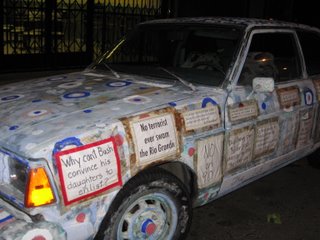

Continuing the week in pictures: Tuesday Night- Election day.
picture 1- My polling place where I cast my vote.
pictures 2 & 3 - Wouldn't it be fitting that after voting I would run into the First Amendment Car? In downtown Oakland, near an empty deli.
After my post-voting depression, I wandered around Oakland and decided to down my spleen with some soup; I went to Pho 84. I realize that we really need to change our life to derail the upcoming total disaster, but sadly, I don't think we will change. Voting for the right progressives is only the smallest step in this needed reform.
picture 4-my painting in my window, which I see everytime I come or leave home, since the window faces the door.
Tuesday, November 07, 2006
(Literary) Girls Night Out




Continuing the week in pictures-
Monday night: I went to a reading at the Beauty Bar in the Mission. This seems to be a new trend: readings in bars, works for me.
The works were not the usual type of books I would read, fiction with plucky female protagonists, but it was an entertaining way to kill a Monday night. The interior of the Beauty Bar is lushly extravagant. The writers were: Heather O’Neill, Emily Maguire, and Sarah Hall. I was drawn to this event because of my curiosity with Emily Maguire; I read her guest blog at Powell's and liked her style. Her story vignette from her book, Taming the Beast, was the most provocative, but as I mentioned before, I usually don't read those types of books.
Pictures came out bleary due to not using flash.
Pictures:
1. Sunset on my home from work
2. BART passenger
3. Emily- profile far left
4. Dogmister- outside the bar
Monday, November 06, 2006
a week in pictures and Korean Restaurants




I will try to present this week in pictures.
Sunday afternoon spent wandering around Oakland's warehouse district and the port.
Also, Oakland Korean restaurant round-up--
Where I live in Oakland, I could easily walk to at least a half dozen Korean restaurants. Yet, I lived in this area for seven years and I had not visited even one. Mostly, this was due to my assumed aversion to Korean food. Being a vegetarian (ok, I occasionally eat fish), I thought there was nothing available for me in Korean food. But after examining menus, I realized that there were enough options, so I decided to take the challenge.
Mic, my intrepid partner in this quest, and I have decided to go around the neighborhood to find the best in Korean restaurants.
Kang Tong Degi
3702 Telegraph Ave.(at 37th St.)
Last Sunday, 10/29, we decided to try out the nearest place. I have been intrigued by this restaurant for a year. I wasn't even sure if it was a restaurant, since there are no English words to indicate what it was. However, when I would walk by in the evening, young Korean kids would be stumbling out in an ecstatic and intoxicated stumble. I thought it might even be some sort of Korean neighborhood karaoke bar. I would try to glimpse into the place when the door was a little open, but I still was not able to discern it. One day we walked in and saw that it was a restaurant, but we walked out quickly, too intimidated.
We took the plunge. The wooden interior creates a cozy atmosphere; semi-private booths line the side of the place. A little group of friends could go in and have a lively conversation without being distracted or distractive. Our server was a slender, good-looking kid, and he was extremely friendly. We had a salmon salad, seafood noodle soup, a kimchee pancake and some sort of ginseng wine; it was a lot of food. We could have done without the pancake, although they crisped it in a tantalizing way; I would like to snack on it while drinking. I was fulfilled by the soup and enjoyed its spiciness; Mic relished the salad, but its sweet dressing did not please me, therefore, he ate most of it.
I would like to go here again after experiencing other restaurants. The atmosphere with its private booths and pleasant wait staff gives this place a plus.
Ohgane Korean Restaurant
3915 Broadway (at 40th St.)
We were on a roll. So on Saturday, 11/4, we tried out this place. It is immense, but it was not crowded. It's definitely a place for family style dining. Huge table with charcoal grills, a giant TV screen (playing a football game- not a plus). We had grilled mackerel, a spicy rice bowl with tofu and veggies and cucumber soju. The soju refreshed us; it was put into a bottle stuffed with julienne cucumbers. Even though I usually do not like tofu, I devoured the rice bowl; it glistened with red peppers, deliciously spiced. Unlike Kang Tong Degi which gave us 5 or so banchan (little plates of snacky things), here we had about 12 banchan- and half of it was kimchees, which I vociferously gobbled down (I love kimchee). I preferred the food here, but disliked the atmosphere. Since I do not watch television at all, when I see one I am disturbingly hypnotized by it, as though it is a technological mind control device to which I have no immunity. So dining at a place with a TV brings it down a few points.
Two down- now we only have 25 or more to go!



